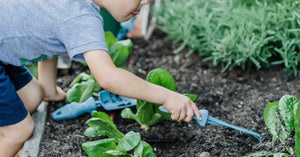How Gardening Supports Child Development
Oct 23, 2024
Gardening is a magical activity that can greatly benefit children in numerous ways—and not just by making them happy by letting them play in the dirt.
Gardening can support a child's development, both mentally and physically. It can help them learn valuable life skills, cultivate a deeper understanding and appreciation for the natural world, and foster a sense of responsibility and independence, among other benefits. Let's take a closer look at how gardening supports child development, and how you can get the kids in your life involved in this rewarding activity.
The Benefits of Gardening on Child Development
Gardening is about more than just growing plants. It involves a variety of tasks and skills that can contribute to a child's development. Some ways gardening can contribute to a happy, healthy child include:
Hands-On Learning
Children learn best by doing, and gardening provides ample opportunities for hands-on learning. From planting seeds to watering plants, kids have a hand in every step of the process. This active participation helps them understand where food comes from and introduces them to the basics of biology and ecology. They get to see firsthand how plants grow and change, which can be a fascinating and educational experience.
Boosting Creativity
Gardening encourages kids to use their imagination. Whether they're choosing which flowers to plant, designing a garden layout, or decorating plant pots, creativity is always at play. This freedom to create and design helps foster an innovative mindset. Plus, the colorful and diverse nature of plants can stimulate their artistic senses, making them more appreciative of the beauty around them.
Physical Activity
Gardening gets kids moving. Digging, planting, watering, and weeding are all physical activities that help improve motor skills and overall fitness. Unlike structured sports, gardening offers a more relaxed way for kids to stay active while enjoying the outdoors. The physical exertion also helps burn off excess energy, making it a perfect activity for young children who are always on the go.
Responsibility and Independence
Gardening requires patience, dedication, and responsibility. As children care for their plants, they learn the importance of being responsible caregivers. They understand that their plants rely on them for water, sunlight, and protection from pests. This sense of responsibility can also translate into other areas of their lives as they grow older.
In addition to responsibility, gardening also encourages independence in kids. They get to make decisions about what to plant and when to take care of their garden. This autonomy can help build confidence and self-esteem as they see the fruits of their labor grow.
Connecting with Nature
Technology disconnects many children from the natural world. Gardening provides an opportunity for them to unplug and reconnect with nature. Kids get to see the beauty of plants up close, observe insects and birds in their natural habitats, and learn about the importance of caring for our environment. This connection can instill a sense of wonder and appreciation for the world around them.
Gardening really is a magical activity. What other hobby allows kids to learn, create, exercise, and connect with nature all at once?
What You Need to Start Gardening with Kids
With all the benefits gardening has to offer, parents and educators are eager to get children involved. But before you introduce the kids in your life to the wonders of gardening, you'll need to prepare a few things. You can't start a garden with just imagination and willpower, after all!
A Suitable Space
You don't need a big backyard to start gardening. A small patch of soil, a few pots on the balcony, or even indoor containers can work. Just make sure to choose a space that gets plenty of sunlight and is easily accessible for the kids. They'll be more likely to engage if they can see and reach their garden easily.
Basic Tools
Starting a garden doesn't require fancy equipment. A few basic tools will suffice. At minimum, you'll need a small shovel, a watering can, and perhaps a pair of gloves. Invest in child-sized tools that are easier for kids to handle and also lack the dangerous sharp edges some adult-sized tools have.
Low-Maintenance Plants
When gardening with kids, choose plants that are easy to grow and maintain. Sunflowers, cherry tomatoes, and beans are great options. These plants grow quickly, which helps keep the kids interested. They also produce visible results that children can enjoy, whether it's a colorful flower or a tasty snack.
With a place to garden and a few basic supplies, you can start your gardening journey with the kids.
How to Get Kids Interested in Gardening
While some kids will be eager to join you in the garden right away, others may need a bit more encouragement. How do you get a child that's not all that interested in gardening to give it a chance? Here are some tips:
Make it a Game
Turn gardening into a fun game to capture the child's interest. You can create challenges such as "Who can plant the most seeds?" or "Let's see who can water the plants the fastest." These simple games can make gardening more exciting and competitive, which may entice the child to join in.
Let Them Choose
Giving kids a sense of ownership is a great way to get them involved in any activity. Let them choose what plants they want to grow or how they want their garden to look. This will give them a sense of control and responsibility, and they'll be more invested in the process as a result.
Make it Educational
Kids love learning new things, especially when the activity is presented in a fun and engaging way. Take this opportunity to teach them about different types of plants, insects, or even the weather. You can also introduce simple concepts, such as photosynthesis or the importance of pollinators. By making gardening educational, you'll pique their curiosity and make it more than just a chore.
Lead by Example
Children often learn through imitation, so the best way to get them interested in gardening is to show them how much fun it can be. Involve them in your own gardening activities and let them see how much you enjoy it. Your enthusiasm will be contagious, and they'll want to join in on the fun too.
Be Perseverant
Don't get discouraged if a child isn't immediately interested in gardening. Keep encouraging them and involving them in small ways, even if it's just for a few minutes each day. As they see the results of their efforts and experience the joys of gardening, they may eventually become more enthusiastic about it.
Gardening can be a wonderful way to support a child's development. It can teach them about patience, about the beauty and complexity of nature, and about responsibility. These are all valuable life lessons that can shape a child's character and result in them becoming a caring and well-rounded individual.
If you're looking for resources to help get your child started with gardening, Rutabaga Education offers fantastic materials for kids' gardening education. We provide books, blogs, and tools to help educators and parents teach kids about the joy hunkering down in a garden can bring. Check out our resources and get your kids hooked on gardening today!



